#To said head of the clan/kingdom having to decide said infant's fate
Text
Hamato Yuuta, upon finding baby Oroku Saki : It's just an infant... It's just a boy... What sort of imminent threat does he pose that I cannot avoid?
#Tmnt 2012#Epic : The Musical#Hamato Yuuta#Oroku Saki#Shredder#I'm never listening to Epic the same ever again#I can't with how perfect this lines up#From the head of the clan/kingdom finding the infant heir to the enemy clan/kingdom#To said head of the clan/kingdom having to decide said infant's fate#To that kid inevitably growing up to cause Problems™#'I could raise him as my own!'#'He will burn your house and throne.'#The only difference between Ody and Yuuta is that Yuuta chose to adopt the kid#And look how that turned out
3 notes
·
View notes
Text
Souta, Son of the Chariot
This was tipped off to me by @inn-8-woolgatherer and further consulted by @karnasofsun on twitter.
In the hindu epic Mahabhrata, there is a character known as Karna. Karna is a demi-god, that is the half blooded son of a divine entity and a human. Kunti the princes of the Kunti kingdom had been granted a boon by the sage Durvasa to invoke any deity to give her a child. Eager to test the power while still unmarried she called upon the sun god Surya, and was handed a son Karna. Afraid of being unwed, the illegitiate son was placed in a basket and set afloat among the river abandoned.
The infant was given many names, along with many curses in his life. One of those names was “Souta”, which means son of Souta or belonging to the charioteer caste. In other words despite being half divine, Karna is abandoned or kept seperated from both parents and instead lives a life defined by the station of his perceived birth.
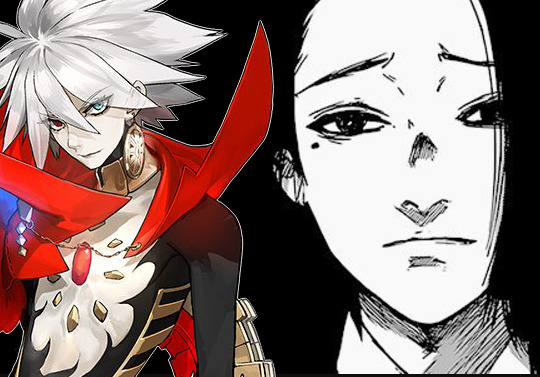
Though he possessed his father's brilliant authority, his form was stained black. His countenance was cruel, and his every action was violent. Because of his lack of human mother, he didn't learn the subtleties of human emotion and spent his days being considered a nuisance by the people around him.
Source [x]
Who are they talking about here, Souta or Karna?
Of course this is from Fate which probably isn’t the best source of mythology of another culture, but if there’s anything to take from it, this is another Japanese interpretation of what Karna would be like represented as a character and it comes off sounding similiar to both the manner in Furuta acts and even his iconography and the way he was raised.
There are clear parallels between the two stories, and the strongest comes from both their origins, and the role they eventually end up taking in the stories, where they both end up being portrayed as villains regardless of what their true intentions are. Mythology, especially Hindu mythology is built around heroes with human flaws, and Karna despite being half god demonstrates a lot of these human flaws and complexity throughout life. Despite being a well intentioned and diligent person, due to a great misfortune he ends up being cast as a villain in his untimely ending.
Perhaps in unraveling his story we’ll find a bit more of what Souta’s current motives might be, and the role in the story he’s meant to take.
There is a lot of Karna’s story to unpack, but to begin with the name Souta originates from his founding by Adhiratha, a charioteer of King Dhirashtra of Hastinapur. Due to being the son of a charioteer, he was therefor himself in the caste of the charioteers for his life.
Here’s a quick article on the Suta, [x] it seems in stories they were for the most part either bards or charioteers. Mahabharata may itself be an exploration of the caste system as a whole as it’s one long epic poem that meditates on a lot of topics [x]. Go read it for yourself, the caste system isn’t going to be explored here other than the fact that it exists.
Furuta as well could be considered a son of a charioteer. The Washuu family has long been associated with tarot card number 7, which is the chariot. There’s a quick overview of the card here [x].
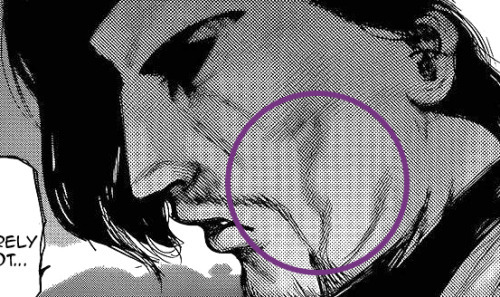
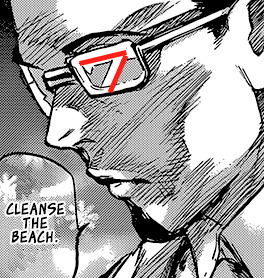
Not only is he the son of a chariot, but despite having royal blood Furuta is placed in a caste that is much lower than the one he ought to belong to. He even tells Kaneki of this in his basic description of the Washuu family tree, that both he and Arima were born as unfit goods which make up the vast majority of V’s servitude.
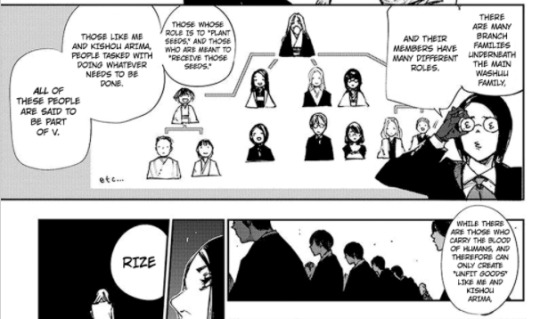
Furuta carries the blood of the absolute leader of the CCG, but he himself was thrown away as a child among the rest of the unfit goods. His mother for the most part isn’t even shown to be alive and we have no idea what happened to her, whereas Furuta knows of his connection to his father but Tsuneyoshi seems to hold no regard for him as a son at all. Furuta says that Tsuneyoshi probably did not remember his name, and the idea of not being able to call his father father, sets him off.
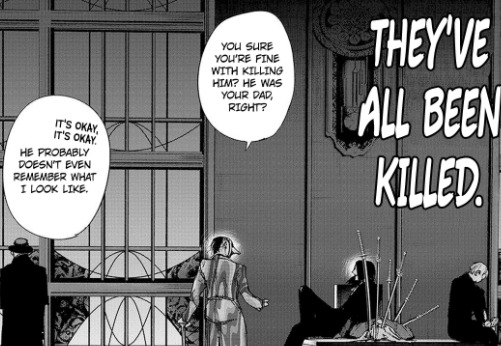
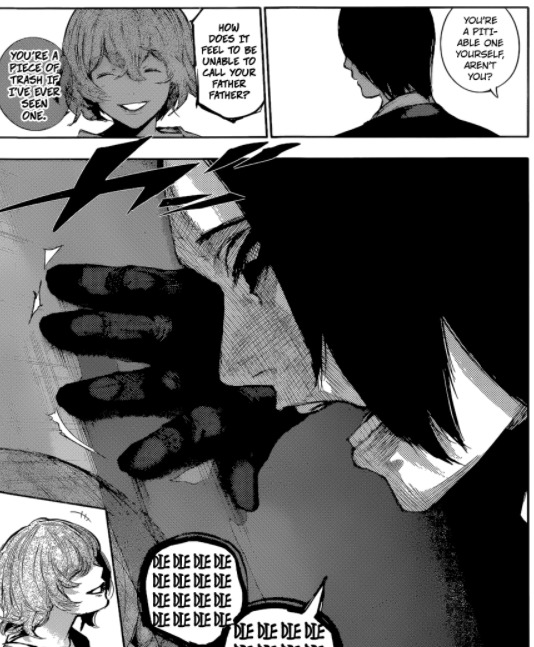
There are some differences the sun god did not forget about Karna, he simply could not interfere in the mortal realm because he was divine. Karna also experiences a similar shaping from his abandoment and a want to prove himself as a warrior despite where he was placed because of Caste. This is of course an idea which contradicts the caste system. Which again, explaining in its simplest form because of time constraints, if you were born a charioteer it is better by the caste to be the world’s worst charioteer than to try being a warrior.
Karna tries to learn from a sage, but is cursed when the sage found out he was a commoner. Later when he waent to a fighting contest and tried to challenge Arjuna, he was laughed at for being a commoner. These were the reasons that the main villain, Duryodhana took him in and asked him to join his team.
Souta, before becoming Kichimura, also had many traits that made him unmistakable for a commoner. His main function was serving paperwork, he was a lackey, first to Kijima and then to Kaneki.

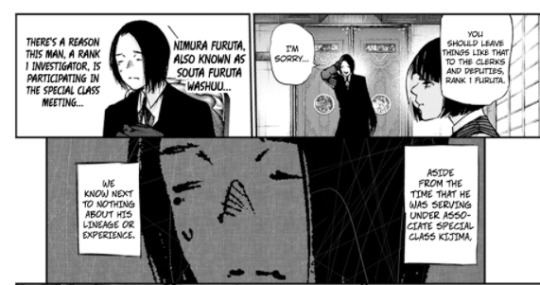
Furuta is even referred to as a dull ranked one investigator that nobody knows anything about. Unlike Arima or Hairu his fellow garden children, Furuta never seemed to rise to any sort of prominence within the CCG, and instead he was accepted in by a different crowd.
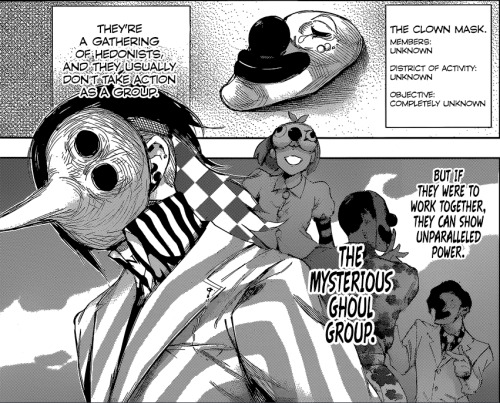
The clowns are also marked as a “Villain Group” the same way Karna himself becomes perceived as a villain in his own story simply by being taken under the wing of Duryodhana.
There is of course differences as Furuta willingly places himself in the seat of villain whereas Karna is merely associated with one as a part of the group he’s in, and Furuta also is much more malicious while Karna was good hearted and tried to curb the more villainous actions of the people he was working with.
However, there is a similarity between the two stories of a hero, stepping into the role of a villain and being slain as a villain.
Ajruna who once again is the man who Karna tried to fight earlier in the legend only to be laughed away. The irony is despite their antagonism and Arjuna’s eventual killing of Karna, the two of them are actually brothers.
But to challenge Arjuna, a member of the royal family, one must be higher than a Kshatriya. However Karna appears to be a lower caste Vaishya (merchant class) or Shudra (a slave). Karna, whose challenge was refused due to the difference in status, was a laughingstock. The one who saved Karna in this situation was Duryodhana, the eldest of the one hundred princes of the Kaurava clan, who opposed the Pandavas.[4] At that time, he already had a premonition that a confrontation with Karna was unavoidable. After all, Karna revered Duryodhana, who regarded the five Pandava brothers as archenemies, like a father.
[x]
The five Pandava siblings are the children of Kunti, who is Karna’s mother who abandoned them which made Karna Arjuna’s unknowing older brother. Of course the accidental killing of family members is common in myth, what sets this apart is Arjuna’s reasoning.
Karna must be killed because he associated with Durydohana, the antagonist to Arjuna’s own story. Karna must become the villain that falls in order to support Arjuna’s rising up as a hero.
When was it that he resolved himself to kill Karna no matter what. Probably, it was when they had first met each other. That was no fate decided by the gods. The karma Arjuna chose together with sheer enmity. Even if it was not righteous. Arjuna had to accomplish that no matter what.
That their eventual conflict was not one that rose about necessarily out of personal differences, as the two of them both were similiar both brothers and both well intentioned, but rather their conflict came about because of their roles in society. What is fate but a metaphor for a role you are meant to live up to, dictated upon you by others?
This inevitably leads to the theory that rather than truly attempting to seize control of the CCG for personal gain and power, Furuta is instead acting as if the villain were a role for him to play so that a great hero can strike him down. There are a few hints of this in canon, Eto says that Furuta cares not for the CCG or the Washuu.
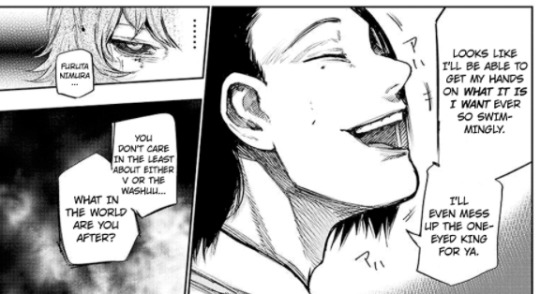
Kaneki asks if he’s really causing all of this destruction just to fulfill his childhood dream of being the head of the Washuu family. Then suggests afterwards that Furuta might not be a permanent fixture atop the CCG.
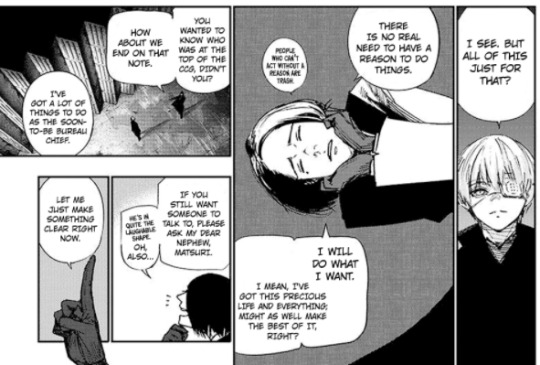
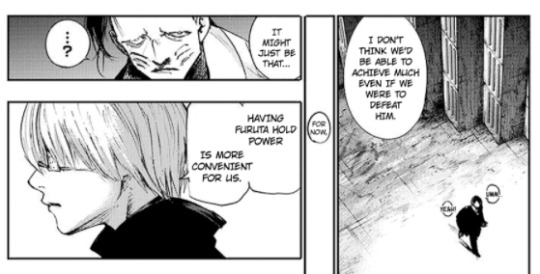
Furuta even suggests a version of the proposed plan to Kaneki, that one of them play a villain so terrible that humans and ghouls have no choice but to unite against him.
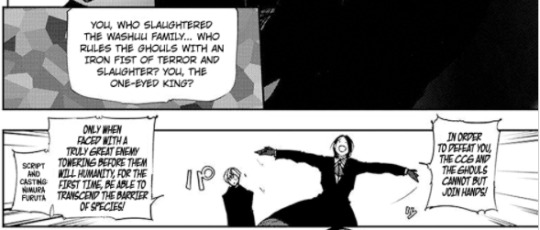
Uta questions much later on whether Furuta’s actions are meant to be an end for ghouls or the CCG. Ui says his rise to power is what signals the death of the CCG.

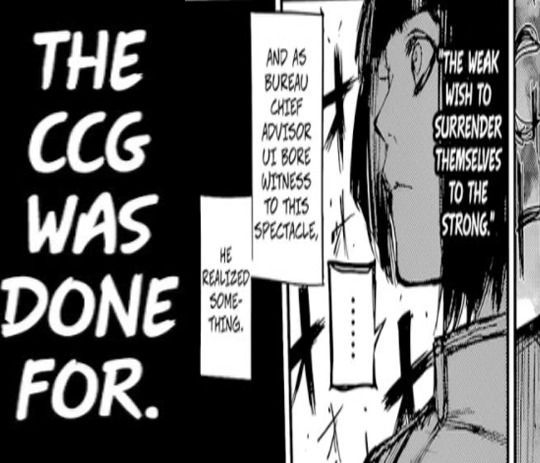
When talking about his plans in general, he uses story terms like “Last Boss”. Which suggests that like the clowns in general he too can think of things in the terms of story structure and layout even when they tend to be happening in reality.
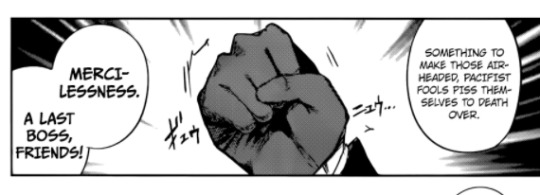
Furuta’s actions in seeding humans among the clown members are said specifically to “make their opponent feel as though they’ve sinned” which could hint that his actions are ironically done to highlight what exactly is wrong with the CCG by turning it up to 11.
His mannerisms as a leader are stolen from others, he speaks with Yoshitoki’s voice and uses Marude’s words, while pushing the situation up to 11 once again almost as if it were a parody of those same well respected leaders.
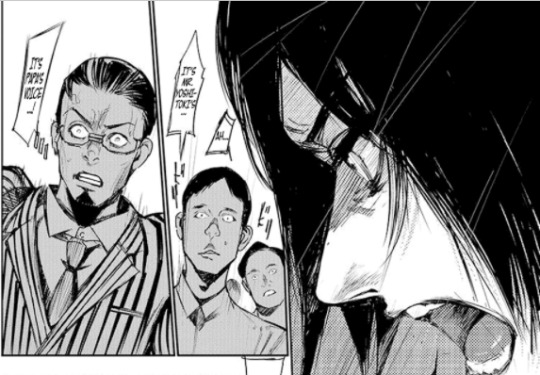
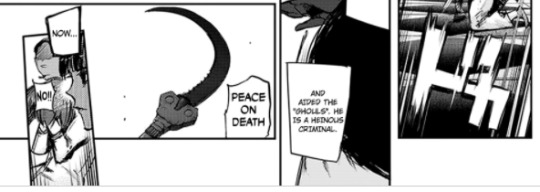
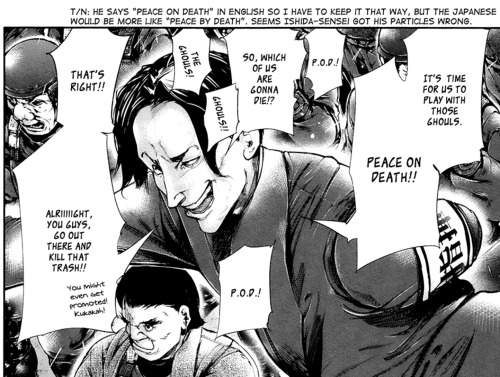
It’s possible that Furuta’s increased antagonism for Kaneki is simply to provoke a fight out of him, to do same as Arima did and make himself into a great villain that now both humans and ghouls have to unite in order to defeat a much greater enemy that threatens them both.
This of course does not excuse Furuta’s lack of regard for life as the stepping stones to his plan, as those ghouls who died along the way can never be returned. Another thing is you are what you pretend to be, so even if Furuta adopts these mannerisms ironically, the tyrannical, manipulative, unscrupulous attitude which he constructs himself with are still actions he chooses to take and those have consequences mostly to the people around him who become victims to his schemes.
However, there’s still a great similarity to be drawn between Furuta and Karna. The both of them half breeds who were destined to be below the ruling class since birth. That despite their position, they were welcomed in by another crowd even though the crown that adopted them turned out to be villainous. That the two of them in thier roles, stretch and question the role of villain and heroes in their respective stories.
#furuta nimura#furuta souta washuu#kichimura washuu#damnit you have so many names#tg meta#meta#tokyo ghoul meta#hindu myth#mythology#mythological parallels
61 notes
·
View notes